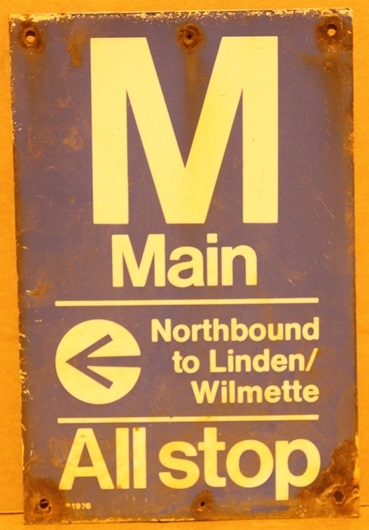The Chicago Transit Authority cleaned out its attic recently and put a bunch of artifacts up for auction. The auction just ended, and I'm sorry to say I did not win anything.
 I bid on a couple of 1990s-era station signs, one from Main and one from Davis. I didn't want to risk getting both so I dropped off the Davis auction once it hit $50. Because, rusty 30 x 45 cm sign with the paint chipping? Yeah, $50 sounds right.
I bid on a couple of 1990s-era station signs, one from Main and one from Davis. I didn't want to risk getting both so I dropped off the Davis auction once it hit $50. Because, rusty 30 x 45 cm sign with the paint chipping? Yeah, $50 sounds right.
But I kept going on the Main St. sign, using the ancient eBay technique of waiting until the last few seconds to make my last bid.
So, the first day of bidding, I put in $25. Auto-bids pushed right past me. Then I waited. Just now, with the bidding at $95, I put in what I thought was a ridiculous (but still acceptable) number: $130. Bam! Bidder #37522 auto-bid right past me!
Now, I'm thinking, as attractive an artifact as the sign might be, is it really worth $150? Oh, the pain, the pain...yes. All right. It's a unique part of history, part of my history in fact, so it's worth $150 to me. Bid.
D'oh! Bidder #37522 thinks it's worth more than $150, and his auto-bid won.
Well, I'm glad the sign is going to a good home. I hope Bidder #37522 finds a nice place on his wall for it.
But I have no idea what Bidder #37961 is going to do with the rail car he bought for $13,150...
(Fun fact: the CTA Gift Store sells signs.)
Update: Looking through the closed lots, I discovered that someone bought two sticks of rail for $50. Let's do the math here. The sticks are each 11.8 m long, and the description says they're 115-lb rail. That means the rail weighs 115 lbs per foot, so the two sticks together contain 4,068 kg of steel. I don't know scrap prices, but it seems to me that 4 tons of steel scrap might be worth more than $50. So assuming the costs of removing the rails aren't too high, someone may have just made a tidy profit on the auction.
Update: It turns out, scrap steel goes for about $350 a ton. So that $50 investment could bring the buyer a tidy $1300 profit. But then one has to ask, why didn't the CTA just sell the surplus rail for scrap in the first place?